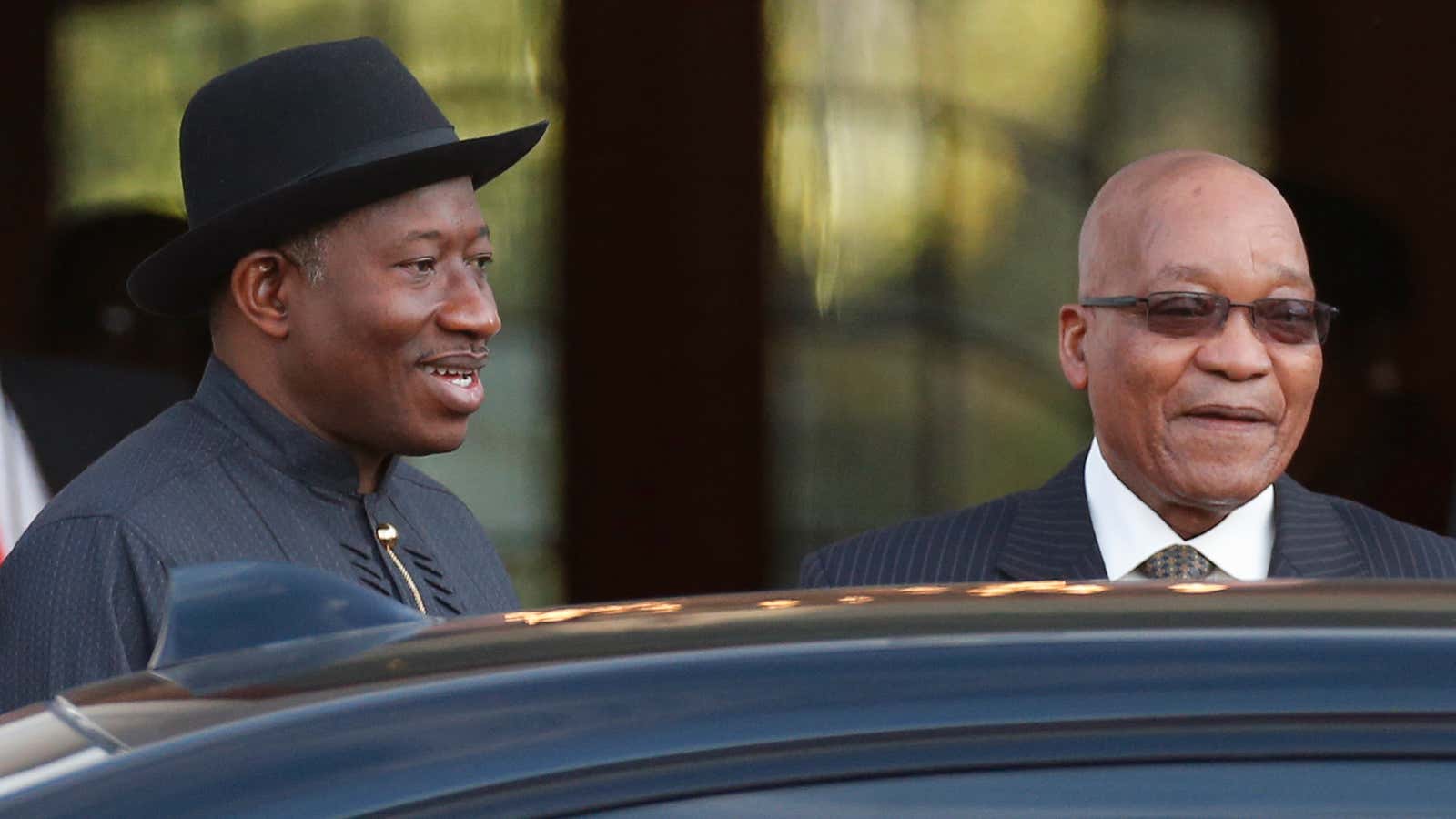Since the beginning of the latest sweep of xenophobic attacks predominantly against fellow Africans in South Africa, the rest of Africa–and the world–has looked on in dismay. In Nigeria, which overtook South Africa as the continent’s largest economy last year, there have been many commentators on local TV and newspapers reminding people of the lead role Nigeria played in the anti-apartheid fight in the 1970s and 1980s.
But in recent years–particularly under the governments of Nigeria’s president Goodluck Jonathan and South Africa’s president Jacob Zuma–that special relationship has gone awry. And it has again come to the fore in the wake of the xenophobic attacks.
On Sunday, South African Head of Diplomacy, Clayson Monyela, issued a particularly snarky media statement highlighting the simmering diplomatic tensions between the continent’s two economic and political powerhouses.
Monyela pulled few punches in criticizing Nigeria’s alleged decision to recall its two top diplomats in South Africa in response to the month-long xenophobic attacks in South Africa.
But Nigeria’s Deputy Foreign Minister, Musiliu Obanikoro, is adamant Nigeria has not recalled anyone. Obanikoro said via Twitter that Nigeria merely summoned its high commissioner back to Nigeria for consultation and disputed news reports saying otherwise.
But South Africa’s terse statement, was in response to earlier reports of the recall. “We are not sure which actions or behaviour of the South African Government the Nigerian Government is protesting. It is only Nigeria that has taken this unfortunate and regrettable step” said Monyela in the statement.
But the real zinger is in the last sentence:
“We shall also continue to support and not blame the Nigerian Government as it battles to deal with Boko Haram that continues to kill many innocent civilians. We hope that the more than 200 girls kidnapped by Boko Haram will someday be reunited with their families.”
Ouch.
Soured relations
That wasn’t the only key mention in Monyela’s note. The tragic collapse of a guesthouse on the premises of the Synagogue Church of All Nations (SCOAN) building in Lagos, Nigeria last September was also striking. The collapse, which saw the death of 115 people, 84 of which were South African, was mired in diplomatic tensions.
The repatriation of 73 of the 84 South African bodies took 9 weeks – during which Nigeria is reported to have refused South African assistance for DNA testing and medical support. The remaining 11 bodies were only repatriated in early February this year, after Nigerian officials claimed that a number of bodies had not been positively identified and therefore could not be repatriated.
On 5 September, one week before the SCOAN tragedy, South Africa seized $9.3 million, reportedly earmarked for the illegal purchase of weapons for Nigeria’s ante against Boko Haram, at Lanseria Airport in Johannesburg.
Then there was Nigeria’s refusal against a South Africa-inspired rapid response force to combat Boko Haram but instead hired ex-Apartheid soldiers as mercenaries, and the controversial 2012 election of AU Chair, Dr Nkosazana Dlamini-Zuma.
In just over a month, the African Union will hold its 25th AU Summit in South Africa, it remains to be seen if South Africa and Nigeria can use this platform to ease the tensions and strengthen their relations and focus on the ordinary citizens of both countries.
After all, it is the grass that suffers when two elephants battle.
